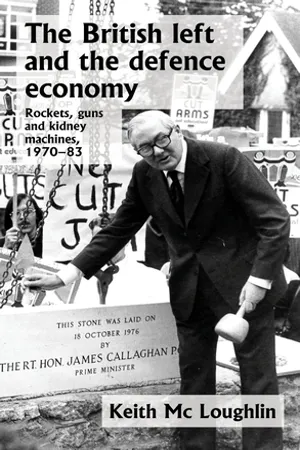1
The left and the defence economy in the early Cold War
The dispute over Britain's defence economy on which this book is based had its roots in the early years of the twentieth century. The left had a complex history with ‘militarism’ and the war economy. The pioneering socialists Beatrice and Sidney Webb made the case on the eve of the First World War for the compulsory devotion of ‘twenty hours a week to a course of physical development, technical education, and military training’ for young men, believing that the ‘economic and social advantages would in themselves be fully worth its cost’.1 On the other hand, other prominent Labourites such as Keir Hardie and Ramsay MacDonald objected to British participation in the First World War on conscientious grounds. During the depression of the 1930s senior Labour figures and left-leaning economists supported a form of ‘military Keynesianism’ where the state invested in the defence economy to stimulate growth and reduce unemployment.2 Although the rearmament programme failed to live up to expectations, many on the right wing of the Labour movement, including politicians and trade unionists, believed that defence had an important role to play in economic, industrial and social policy.
Having demonstrated its aptitude in helping to manage the war economy, Labour won a landslide victory in the 1945 general election on the platform that, having won the war, Britain was ‘preparing to win the peace’.3 That Labour government, led by Clement Attlee, nationalised large parts of industry and expanded the welfare state in a programme of democratic socialism that was unprecedented in its scale and left a legacy that subsequent Labour administrations would ‘struggle to emulate’.4 But the Attlee government that founded the National Health Service (NHS) was the same one that commenced a rearmament programme when relations between the capitalist West and communist East deteriorated in the late 1940s. As well as creating a ‘New Jerusalem’ this government was also building a ‘new Sparta’ as the Cold War began.5 Alarmed by the diversion of material and technological resources to military ends, politicians and scientists on the left warned that this new war economy could undermine the development of civil industry. When a £4.7 billion rearmament package was announced by Labour's Chancellor of the Exchequer, Hugh Gaitskell, in 1951, three ministers resigned in protest. As John Callaghan observed, the left felt that ‘costly overseas military commitments’ meant ‘that the future of the welfare state was jeopardised, let alone any further advances towards a socialist or social democratic society in Britain’.6
After a decade of bitter infighting, the election of Harold Wilson as Labour's leader in 1963 granted the party a renewed sense of unity. But although Wilson's 1964–70 governments reduced defence spending not inconsiderably, his time in office was considered a failure. The promise of his ‘white heat of the technological revolution’ was not realised as Labour's ambitious plans for economic expansion were undone by the objective of holding up the value of the pound. Although the government began the withdrawal from far-flung military outposts east of the Suez Canal, the defence economy was sustained. The continuation of the Cold War commitment, combined with the apparent failure to generate substantial industrial growth, led to a revival of radical socialist thinking within the Labour movement in the early 1970s. As Stephen Meredith observed, ‘the failure of social democracy to cope with economic difficulties’ witnessed ‘the formal abandonment of the traditional tools (and some of the goals) of social democratic political economy’.7 With Labour's right wing in retreat, the left asserted itself in the party's policy committees which were growing in power and influence. As global capitalism descended into crisis while a more peaceful détente characterised Cold War relations, the left felt that the state needed to overhaul industry by converting the defence economy to socially useful production. Within the 1970s ‘marketplace of ideas’ to reverse Britain's economic decline, the left set its sights on the undoing of the military-industrial complex to achieve a socialist anti-militaristic economy.
Guns before dentures
Why the left came to see defence expenditure as the culprit for Britain's postwar economic decline can be explained by its experiences during the 1945–51 Labour government. This was the government responsible for an impressive reconstruction programme, including an ambitious public-housing scheme, the nationalisation of heavy industries and the establishment of the NHS in 1948. But this was also the era of early superpower tensions, a ‘cold war’ in which the government committed Britain to take the side of liberal democratic capitalism in the West against state-socialist communism beyond the ‘Iron Curtain’. The Attlee government's enthusiasm for the North Atlantic Treaty alongside the secret construction of an atomic bomb embodied the shift from Labour's fraternal relations with international socialism to a foreign policy that, as Mark Phythian observed, ‘accepted the logic of Cold War balance of power alliances and high levels of defence spending’.8 This was the beginning of a conflict within the Labour party that would last for the next forty years. As Phythian concluded, Labour ‘was always a broad church, but these issues exposed a fault line that was to wrack the Party from the 1950s to the 1980s’, with the issues not only affecting foreign policy but also dictating ‘the limits of the possible in domestic policy’.9 The Cold War was as much a matter of economy as it was ideological. The left deeply resented the Attlee government's ‘Atlanticism’, its close relations with the United States that involved both financial reliance and military cooperation. Suspicious of what they felt were the hegemonic ambitions of American capitalism, socialists desired an independent path beyond the influence of either Cold War superpower. Only such a route could ensure ...
